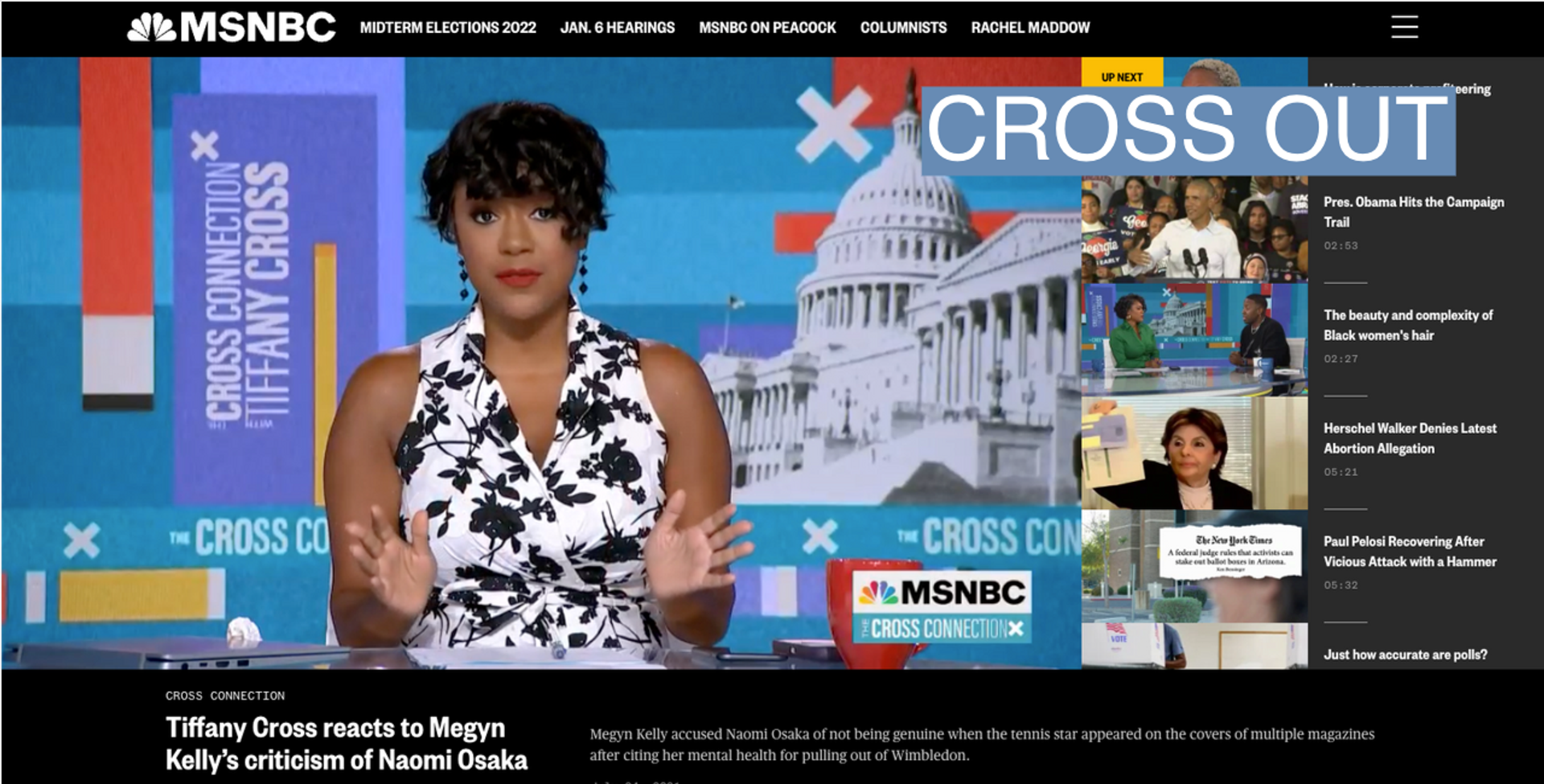The News

MSNBC’s decision to part ways with its top-rated weekend anchor came after an escalating internal conflict.
Network President Rashida Jones had objected to some of Tiffany Cross’s headline-grabbing comments, particularly recent ones about conservative political figures. Other official arms of the news network had similar concerns: NBC’s standards department objected when she dubbed Justice Clarence Thomas “Justice Pubic Hair on My Coke Can.”
The standards department also raised issues with her jab that former Trump aide Alyssa Farah “guzzled down that Kool-Aid like it was the bleach your boss once said cured the ‘rona.’”
The former host declined to answer Semafor’s questions in a brief telephone call on Friday. But she spent the afternoon boosting dozens of tweets that criticized MSNBC’s decision, and wrote in an Instagram post that she was “disheartened to learn of MSNBC’s decision to cancel The Cross Connection at such a crucial time — four days before the midterm elections.”
In this article:
Max’s view
Cross’s involuntary departure from the liberal network reflects a deep tension that has become more pronounced without President Donald Trump to serve as a unifying programming force.
MSNBC’s ratings depend on its delivering a progressive point of view to its liberal audience, which has for years boosted primetime hosts like Rachel Maddow and Lawrence O’Donnell.
But the network also has another less explicit expectation for its hosts: Be nice.
The rule at the network since Trump’s departure from office has been to avoid snark and bombast — much less the combination of the two that conservatives respond to from Tucker Carlson.
Comcast executives have never been completely comfortable with some of the network’s more pugnacious hosts. A prominent executive at Comcast, which owns MSNBC’s parent company NBCUniversal, said privately recently that they saw MSNBC’s goal as cultivating an “opinionated but not edgy” stable of on-air personalities.
That wasn’t Cross. Just hours before she was fired by MSNBC, the host called Florida the “dick of the country” and said it should be “castrated.” That comment did not sit well with Jones, according to one person familiar with her thinking. But Cross isn’t the only host in recent years to make executives nervous. Network higher-ups expressed discomfort with hosts Mehdi Hassan and Ayman Mohyeldin for their coverage of an outbreak of violence between Israel and Palestine in May of 2021.
The network, however, drew a distinction for Cross, whom it felt made inappropriate comments about a number of figures across the political spectrum, including CNN host Van Jones and HBO’s Bill Maher.
Recent moves illustrate the voice MSNBC is looking for. The network moved the former Bloomberg TV host Stephanie Ruhle from a daytime show to the 11 P.M. timeslot vacated by Brian Williams (himself an affable, cool-headed television personality). Nicolle Wallace, the most successful of the network’s stable of Never-Trump personalities, now occupies two hours of the late afternoon and co-anchors during major political events. Alex Wagner replaced Maddow in the network’s coveted 9 P.M. slot.
The network is trying to reach former CNN viewers it sees as available in an otherwise inhospitable post-Trump-presidency media environment, as CNN tries to shift away from strident anti-Trump politics.
Tuesday’s midterms will test this theory. MSNBC is planning heavy overnight coverage the night of the midterm elections and the night after, and has plans to stay on the air through the weekend if results are slow coming in or there are electoral disputes.
Maybe it’ll work. But in the process, the network could end up dismissing some of the nonwhite voices who represent the more progressive or overtly partisan part of the network, who have helped win African-American viewers. Cross’s audience was 35% African-American, according to a memo obtained by Mediaite. Critics of the network’s recent moves point out that two of the shows that Jones has taken off the air have been hosted by black women: Cross and Zerlina Maxwell, who quit the network after her streaming show was canceled.
“How do you allow your hosts to be attacked in a vicious way like Tucker Carlson did and you offer no response?” asked Roland Martin, the former CNN commentator who last year launched the Black Star Network. “I believe what’s vulgar if you allow your on-air talent to be attacked and you let them fend for themselves.”
The cancellations also raise the question of what the MSNBC audience wants, regardless of Comcast executive tastes. Following Rachel Maddow’s departure, the most watched figure on the network on a nightly basis is O’Donnell, a 70-year-old white man who rarely goes viral. Reid, the most prominent nonwhite host on the network, has more modest viewership.
But attempts to reach to the center by elevating or sidelining progressive television personalities could all be moot in several days. If Republicans retake Congress, and Trump immediately declares he’s running again, the fear and conflict that drove cable news’s success for four years will return regardless of who’s delivering the news.
Room for Disagreement
The audience has pulled cable news to target the most engaged partisans. But ratings aren’t the only consideration. The countervailing pressure comes from big advertisers, who have largely abandoned Fox News and are shy of controversy of all sorts. MSNBC and CNN, meanwhile, are part of larger media companies whose executives are similarly loath to be in the center of national controversy. At CNN, the push to the center comes from the top, from a key shareholder in its parent company, John Malone.
Notable
- I reported last week on the cancellation of Shep Smith’s CNBC show, noting that “the slickly-produced, straightforward evening news program had failed to attract the large audience that Smith had in his afternoon slot at Fox News, or produce breakout viral moments that made him a resistance star during the Trump years.”
- Behind essentially every media story right now — including the cuts at MSNBC — is the intense pressure to reduce costs. Alex Sherman looks at how that’s playing out at CNN.